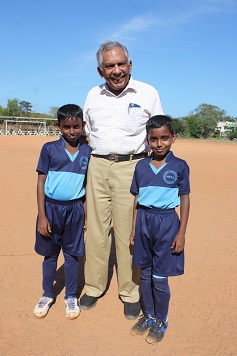
India
M.V. Subbiah
- Executive Chairman, Murugappa Group (Sugar, Agribusiness, Bicycles, Insurance)
Born February 2, 1939 in Pallathur, Tamil Nadu, India. Diploma in Industrial Administration, University of Aston U.K.; PMD Program, Harvard Business School (1971).
“One of the most important things in our culture and our country is the giving back to society.”
Summary
M.V. Subbiah is the Executive Chairman of the Murugappa Group, a large business conglomerate owned by the Subbiah family. The family business dates back to 1900 and operates today in 28 countries with over $7 billion in total revenue. In this interview, Subbiah describes how the family business originated with his grandfather founding a money-lending company in the Chettiar community of Burma (now Myanmar) in 1896. Subbiah's first job was as an errand-runner and assistant for the company. Subbiah describes how his grandfather’s insistence on investing profits into other industries and foreign companies proved vital after the Great Depression and WWII completely devastated the economy of the country. With profits from their investments, the Subbiah family moved to India and in 1949 began operating a bicycle manufacturing company, eventually investing in the raw materials for the bicycles themselves. Tube Investments of India is the family’s flagship company and currently India’s second-largest bicycle manufacturer.
Subbiah discusses his education and schooling, which he says did not suit him particularly well. He preferred hands-on work, moving to the U.K. to train in industrial administration. He was demoted from supervisor to the “shop floor,” which is where he said he learned his biggest lessons in management. He discovered that management works best when it listens to its workers instead of simply giving orders. He took this lesson when going back to help run his family’s business, which now included managing Parry, a candy manufacturing company and India’s oldest sugar company, rejecting management privileges and having regular conversations with non-management company employees.
Subbiah stresses the importance of serving society, meaning younger generations are trained to hold leadership positions and managers transition out of the day-to-day leadership roles as they near retirement. He also says that transferring leadership roles between family members has broadened each person’s business experience and strengthened the family itself, especially when the government regulations prevented the family from merging all companies into one group. The Murugappa Group was officially conglomerated beginning in the 1990s.
Read more
M.V. Subbiah is the Executive Chairman of the Murugappa Group, a large business conglomerate owned by the Subbiah family. The family business dates back to 1900 and operates today in 28 countries with over $7 billion in total revenue. In this interview, Subbiah describes how the family business originated with his grandfather founding a money-lending company in the Chettiar community of Burma (now Myanmar) in 1896. Subbiah's first job was as an errand-runner and assistant for the company. Subbiah describes how his grandfather’s insistence on investing profits into other industries and foreign companies proved vital after the Great Depression and WWII completely devastated the economy of the country. With profits from their investments, the Subbiah family moved to India and in 1949 began operating a bicycle manufacturing company, eventually investing in the raw materials for the bicycles themselves. Tube Investments of India is the family’s flagship company and currently India’s second-largest bicycle manufacturer.
Subbiah discusses his education and schooling, which he says did not suit him particularly well. He preferred hands-on work, moving to the U.K. to train in industrial administration. He was demoted from supervisor to the “shop floor,” which is where he said he learned his biggest lessons in management. He discovered that management works best when it listens to its workers instead of simply giving orders. He took this lesson when going back to help run his family’s business, which now included managing Parry, a candy manufacturing company and India’s oldest sugar company, rejecting management privileges and having regular conversations with non-management company employees.
Subbiah stresses the importance of serving society, meaning younger generations are trained to hold leadership positions and managers transition out of the day-to-day leadership roles as they near retirement. He also says that transferring leadership roles between family members has broadened each person’s business experience and strengthened the family itself, especially when the government regulations prevented the family from merging all companies into one group. The Murugappa Group was officially conglomerated beginning in the 1990s.
Close
Video Clips by Topic
MV Subbiah, the Executive Chairman of the Murugappa Group, a large Indian business conglomerate, discusses the group’s AMM Foundation and its community initiatives that focuses primarily on small towns and villages. This includes the creation of four schools, the introduction of mobile science and medical vans, and four hospitals.
Full Length Video (login required)
Additional Resources
- Cohen, M.L., “Murugappa Group,” in International Directory of Company Histories, edited by Tina Grant, 305-309. Vol. 142, Detroit: St. James Press, 2013.
- Hoovers Online, Murugappa Group, accessed July 19, 2016.
- George Skaria, "The CEO as Family Man(ager)," Business Today India, November 1997.
- J. Ramachandran, "M.V. Subbiah,” Return to Roots, Volume 13, Number 1, Indian Institute of Management Bangalore, March 2001.
- P.S. Vaidyanathan, “We are professionals,” India Today, November 25, 2013.
Interview Citation Format
"Interview with M.V. Subbiah, interviewed by V. G. Narayanan, April 28, 2016, Creating Emerging Markets Project, Baker Library Historical Collections, Harvard Business School, http://www.hbs.edu/businesshistory/emerging-markets/."

